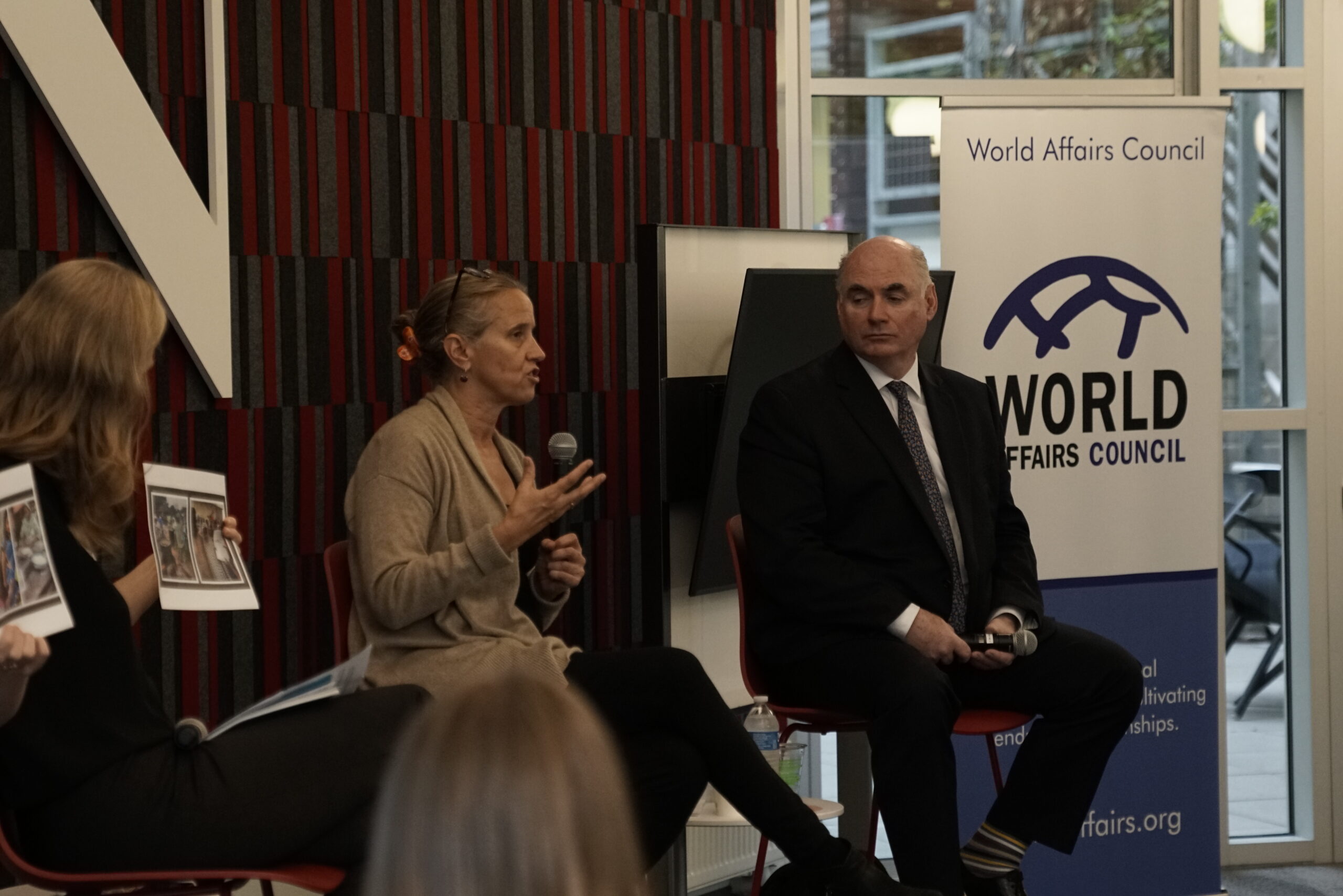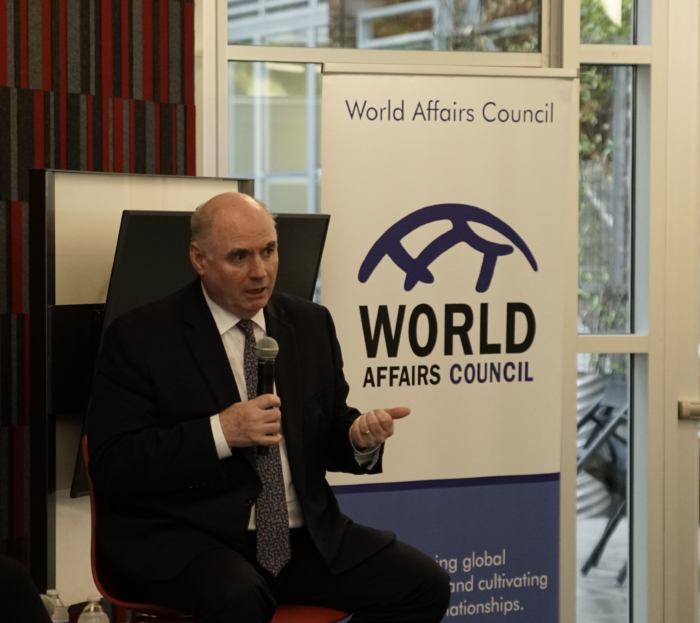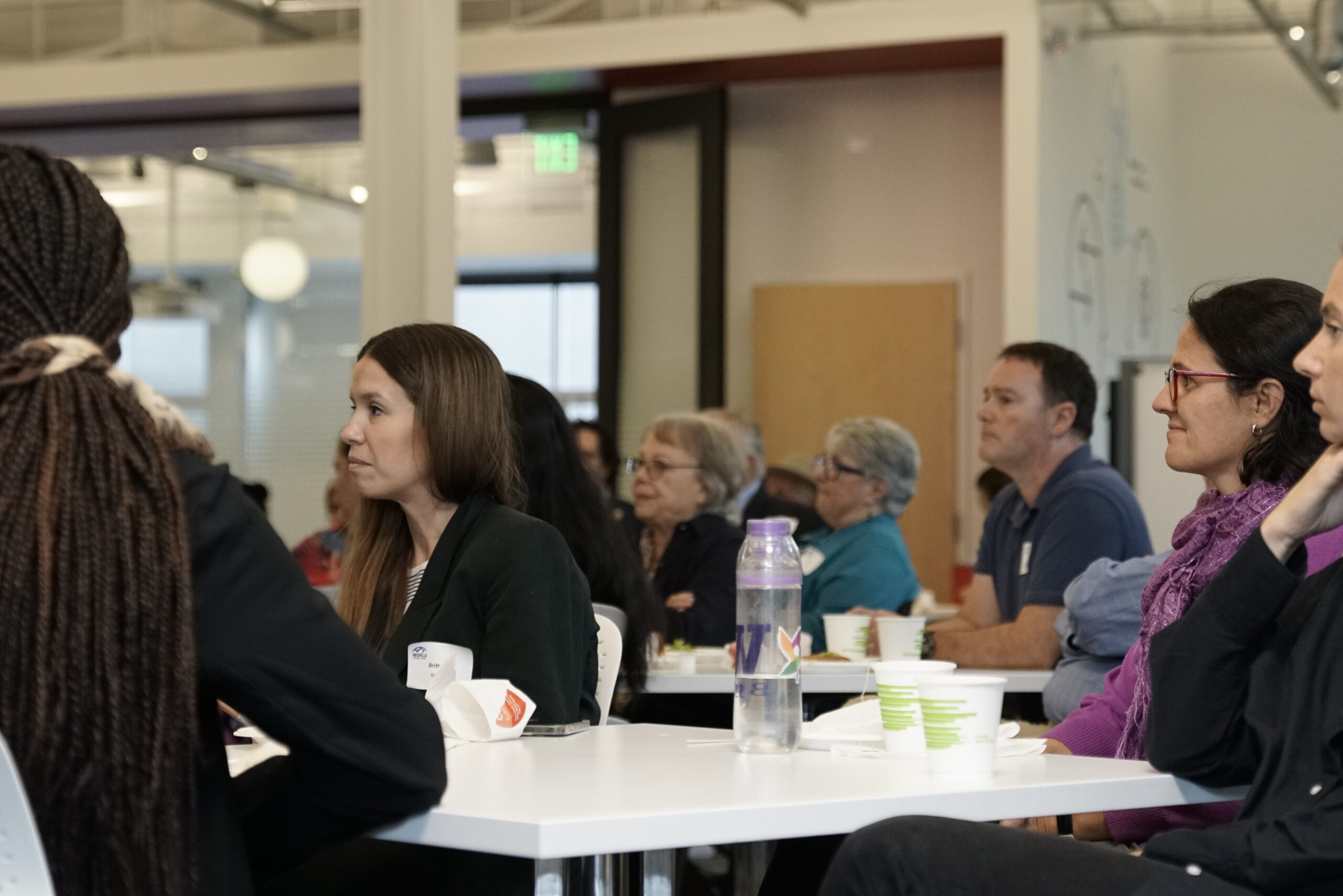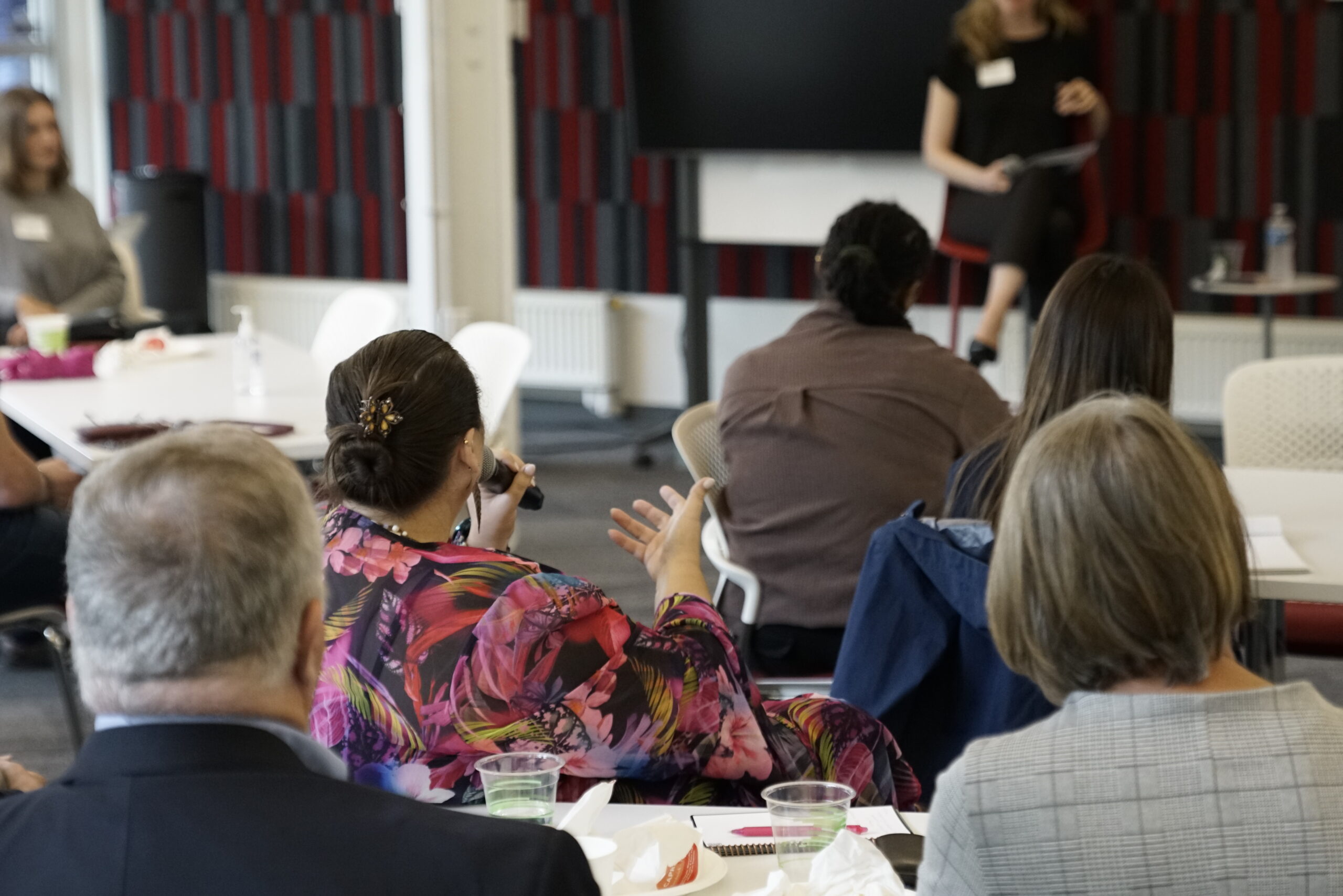Empowering Women in the Workforce: My Reflections from the World Affairs Council’s Discussion
November 1st, 2023
Jen Butte-Dahl of APCO Impact, moderates a panel on women's economic empowerment featuring Greta Bull of the Gates Foundation with Kevin Cassidy of the International Labour Organization (ILO) Office for the United States.
On September 26th, 2023, the World Affairs Council hosted a thought provoking discussion featuring Greta Bull and Kevin Cassidy, two experts in the field of gender equality and workforce empowerment. The event offered insight into how international organizations like the Bill and Melinda Gates Foundation and the International Labour Organization are working to address issues that women face in the workplace. This program highlighted the importance of women’s financial inclusion and the role that technology plays in connecting women to economic opportunities.
The Gates Foundation Collaborative Approach to Women's Economic Empowerment
Greta Bull began by describing the work that the Bill and Melinda Gates Foundation is doing to economically empower women in Sub-Saharan Africa and South Asia. She explained that part of what they are doing is helping women increase their sources of income. Greta also brought up two important points. The first is that many women are entrepreneurs out of necessity, not choice. Many women who become entrepreneurs out of necessity do so because there are very limited opportunities for them in the workforce otherwise.
I thought this point was interesting because stories of female entrepreneurs are often highlighted as success stories when discussing women, especially women from Sub-Saharan Africa and South Asia, in the workforce. Although I think it is important to highlight these stories, I think that it is also important to recognize the root causes and barriers to promote women’s equality in the workforce and that there is still a lot of work to be done.

Greta explains the difference between empowering women and giving women the opportunity to claim their own power.
The second point that she brought up is the difference between empowering women and giving women the opportunity to claim their own power. Empowerment is an action that is done to another person, but by giving women the opportunity to claim their own power they are able to make that decision for themselves.
While this was briefly mentioned, I found this perspective to be really thought provoking. I hadn’t considered this idea prior to this event, however, as I’ve reflected on it, giving women the opportunity to claim their own power seems like a more collaborative approach. It suggests that the women receiving support have a voice in how they are being supported based on their needs. The work that the Bill and Melinda Gates Foundation is doing felt personable due to their ability to directly connect with individuals benefiting from this work.
The International Labour Organization's Rights-Based Approach
In contrast, Kevin Cassidy explained how the International Labour Organization (ILO) is more involved with the policy side of women’s economic empowerment working at the government level. The ILO encourages countries to ratify conventions so that those legislators have an obligation to implement policies to reduce inequities faced by women in the workforce. Kevin describes this approach as a rights based approach where the ILO is working to ensure that women are able to fully realize their human rights, enabling them to better participate in the workforce.

Kevin describes how the ILO is reducing legislative barriers that cause gender inequality in the workforce.
I thought that this was a very important approach to consider, because there are still many legislative barriers that impact the extent that women are able to participate in the workforce like legal restrictions on women’s access to financial resources, limited access to education, and withholding human rights, which heightens gender inequality in workplaces.
Kevin acknowledged that the limited number of job opportunities available to women leaves women especially vulnerable to exploitation, abuse, and harmful working conditions in the workplace. He explained that when women are desperate for jobs, they are less likely to care about the working conditions they are exposed to and if their rights as workers are being met.
This made a lot of sense, however I had never considered how limited job opportunities increases the risk of abuse and exploitation. When women have so few job opportunities, they have no leverage to fight for safer working conditions. The ILO’s rights based approach enables the ILO to fight for better working conditions, which simultaneously reduces gender inequality in the workplace.
Approaches to Women's Economic Empowerment
I think that both of these approaches are important because the barriers restricting women’s abilities to participate in the economic sector are multifaceted. On the one hand, societal factors, such as gender stereotypes and norms, reduce women’s access to community support and resources that would help them succeed in the workforce. Additionally, negative attitudes towards women working discourage many women from even considering entering the workforce. By providing resources and support, organizations like the Bill and Melinda Gates Foundation are not only opening the door for women to enter the workforce, but also providing them with the foundational tools they need to be successful.
However, there are still many legal barriers preventing women from being able to enter the workforce and amplifying existing gender inequalities. As I previously mentioned, women are at a higher risk of abuse, exploitation, and harassment at their place of work. The ILO estimates that 1 in 5 people employed have experienced violence and harassment in the workplace and women are nearly twice as likely as men to face workplace violence and harassment. Kevin Cassidy did mention that it is difficult to gather exact data on workplace violence and harassment because victims fear speaking up will result in retaliatory measures such as losing their jobs. By emphasizing the importance of workers rights, the ILO is working to reduce existing workplace inequalities. Their hope is that by reducing workplace violence and harassment and reducing gender inequality, retention rates of female employees will increase overall.

Community members listen to the panelists discuss the various approaches for promoting women's economic empowerment.
How Do We Keep Gender on the Global Agenda?
The fight for women’s rights is an ongoing battle that is often pushed to the side in response to issues that are seemingly more pressing. Greta reemphasized over and over again the importance of keeping gender equality on the table. She explained that gender is a thread that runs through other global issues. In other words, gender intersects with nearly every other social and global issue. Women are therefore disproportionately impacted by global issues. By pushing gender to the side, the gender disparities resulting from other social and global issues are ignored. The intersectional nature of gender makes it impossible to fully separate it from other global issues.
This is something that I have learned about time and time again, yet it seems like it is often overlooked. It is impossible to make substantial progress on gender equality and other global issues without considering the role of intersectionality. Because gender plays a role in the disproportionate impacts of every other issue, it is ignorant to assume we can make substantial progress in other areas while ignoring gender inequality.
Although Greta made a great argument for why we should keep gender on the agenda, someone posed the question of how exactly we go about doing this. Kevin emphasized that talking about it is a good place to start. He claimed that keeping the conversation going is crucial for working towards progress, even if progress is occurring slower than we would like it to.
I agree with Kevin that it is important to keep the conversation of gender equality going, however I can’t help but feel like that is not enough. Although talking about gender inequality has led to some progress, it feels as though we have hit a plateau. Stressing the importance of gender equality can only have so much of an impact and from my perspective it seems like it is time for a new approach or new action. I have reflected on alternative approaches I could take to advance gender equality and I have yet to come up with one. It is not an easy question to answer, but it is one that I plan on exploring more.
Greta added that we can also be more educated consumers and support organizations that are working to advance women’s rights. I agree with Greta that being an educated consumer is a powerful way to inspire change because companies are more likely to implement changes if they feel that there is a demand for it. I also think that it is important to support organizations that are working to advance women’s rights. There are many ways to support organizations, including donations, volunteering, and promoting the organization.

Malia Razzaia, Executive Director of Dress for Success Seattle, asks the panelists what individuals can do to convince the community that women's economic empowerment is important.
How Do We Convince Others Members of Our Community to Care?
It is clear that everyone at the event cared about women’s empowerment, but how can we persuade individuals who don’t already care about this cause? Kevin said it best when he explained that mentality about gender norms and stereotypes have to change in order to convince individuals to care about this issue. He explained that the concepts around gender norms that dictate “what a woman is and what a man is,” are stunting our progress. Gender expectations diminish appreciation for everything women do for our society. Breaking down gender barriers would lead to more respect and appreciation for women overall, increasing the number of people advocating for women’s rights. As well as releasing some of the societal burden that men carry to be the “breadwinners” or the primary means of financial support for a family.
Final Thoughts
It was hard not to acknowledge that the overwhelming majority of people who attended the event identified as women, however women’s economic empowerment impacts everyone. Including women in the workforce has been shown to benefit the economy and grow the tax basis, which benefits communities as a whole. Additionally, countries with greater gender equality tend to be more cohesive and stable over all. When women are able to succeed in the workforce, they invest in their children and communities. It is time that we stop viewing women’s economic empowerment as a women’s issue and start recognizing that it is as a collective issue.
About the Author: Alexa Kittendorf is an intern for the Community Programs team and is a fourth-year student at the University of Washington. She is pursuing dual degrees in Sociology and Law, Societies, and Justice.